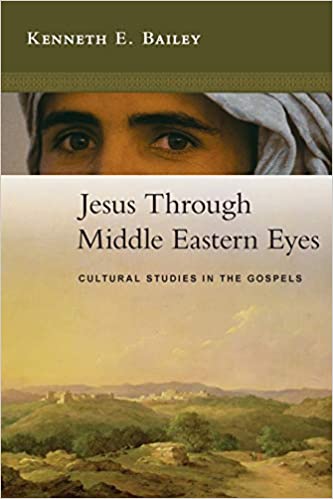Jesus Through Middle Eastern Eyes: Cultural Studies in the Gospels by Kenneth Bailey is an interesting book.
Here’s a description from the publisher:
Beginning with Jesus’ birth, Ken Bailey leads you on a kaleidoscopic study of Jesus throughout the four Gospels. Bailey examines the life and ministry of Jesus with attention to the Lord’s Prayer, the Beatitudes, Jesus’ relationship to women, and especially Jesus’ parables. Through it all, Bailey employs his trademark expertise as a master of Middle Eastern culture to lead you into a deeper understanding of the person and significance of Jesus within his own cultural context. With a sure but gentle hand, Bailey lifts away the obscuring layers of modern Western interpretation to reveal Jesus in the light of his actual historical and cultural setting. This entirely new material from the pen of Ken Bailey is a must-have for any student of the New Testament. If you have benefited from Bailey’s work over the years, this book will be a welcome and indispensable addition to your library. If you are unfamiliar with Bailey’s work, this book will introduce you to a very old yet entirely new way of understanding Jesus.
As I’ve been reading through the book, several interesting insights were given that I hadn’t noticed before.
I’ll mention three.
- He makes an interesting case that the woman caught in adultery is part of the original Gospel of John. Ancient middle eastern families went ape if their woman/daughters were involved in sexual immorality. Sometimes they would kill them for this. Consequently, Bailey suggests that it’s possible that some copyists were asked to omit that story since those who owned the texts didn’t want their daughters engaging in sexual immorality because Jesus forgave the woman caught in adultery. He also points to more popular arguments why the story is authentic.
- He ties Isaiah 66:2 with Matthew 5:3, on being poor in spirit. In the NKJV and the ASV and ERV, Isaiah 66:2 uses the term “poor” instead of “contrite.”
- I’ve never noticed that Revelation 3:20, where Jesus says, “I stand at the door and knock. If anyone hears my voice and opens the door …” Notice He says whoever hears my voice. It’s not just the knock, but the voice underscored there.
The book reads like a commentary. Bailey treats certain texts in the Gospels.
It’s an interesting read and for those who do deep Bible study, I’d recommend it.













